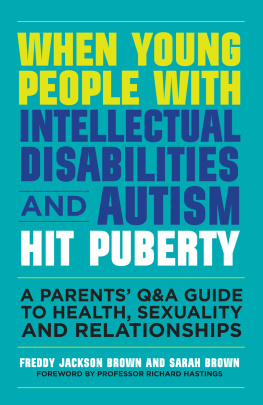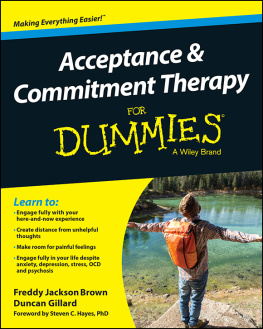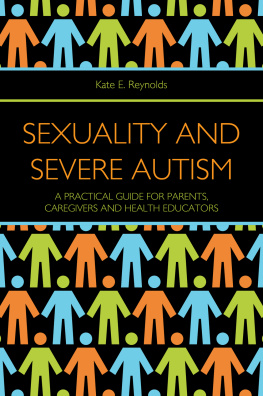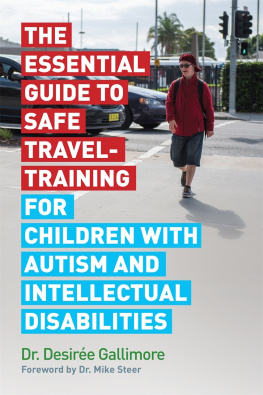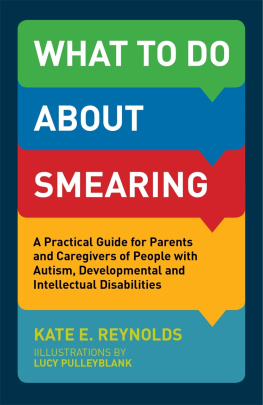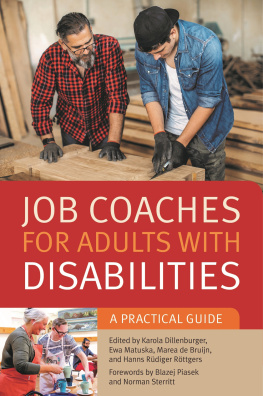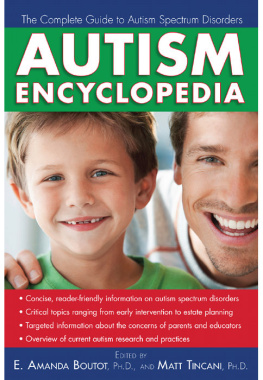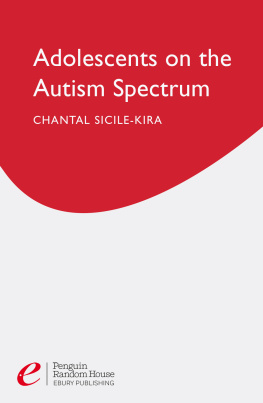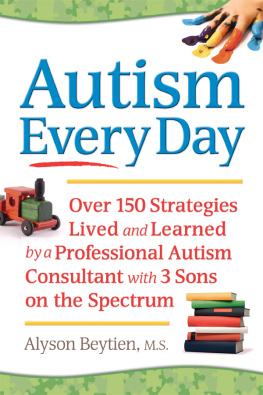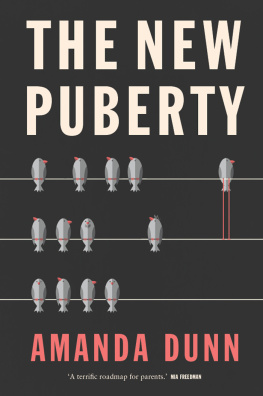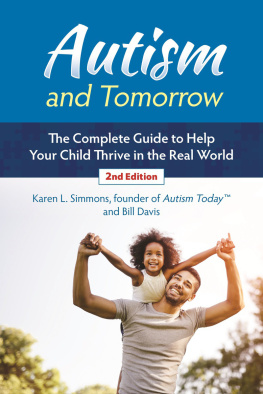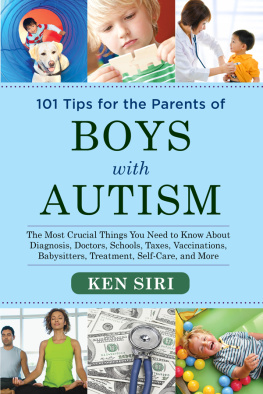
We strongly recommend this book. It provides answers to important questions on real life issues that every parent, carer or practitioner might face today or in the future. A great read and an important addition to sex education literature.
Ioannis Voskopoulos and Labrini Ioannou, Psychologists
of related interest
The Growing Up Guide for Girls
What Girls on the Autism Spectrum Need to Know!
Davida Hartman
Illustrated by Margaret Anne Suggs
ISBN 978 1 84905 574 1
eISBN 978 1 78450 038 2
The Growing Up Book for Boys
What Boys on the Autism Spectrum Need to Know!
Davida Hartman
Illustrated by Margaret Anne Suggs
ISBN 978 1 84905 575 8
eISBN 978 1 78450 039 9
Sexuality and Severe Autism
A Practical Guide for Parents, Caregivers and Health Educators
Kate E. Reynolds
ISBN 978 1 84905 327 3
eISBN 978 0 85700 666 0
Sexuality and Safety with Tom and Ellie series
Books for Young People with Autism and Related Conditions
Kate E. Reynolds
Illustrated by Jonathon Powell
Whats Happening to Tom?
A book about puberty for boys and young men with autism and related conditions
ISBN 978 1 84905 523 9
eISBN 978 0 85700 934 0
Tom Needs to Go
A book about how to use public toilets safely for boys and young men with autism and related conditions
ISBN 978 1 84905 521 5
eISBN 978 0 85700 935 7
Things Tom Likes
A book about sexuality and masturbation for boys and young men with Autism and Related Conditions
ISBN 978 1 84905 522 2
eISBN 978 0 85700 933 3
Whats Happening to Ellie?
A book about puberty for girls and young women with autism and related conditions
ISBN 978 1 84905 526 0
eISBN 978 0 85700 937 1
Ellie Needs to Go
A book about how to use public toilets safely for girls and young women with autism and related conditions
ISBN 978 1 84905 524 6
eISBN 978 0 85700 938 8
Things Ellie Likes
A book about sexuality and masturbation for girls and young women with autism and related conditions
ISBN 978 1 84905 525 3
eISBN 978 0 85700 936 4
WHEN YOUNG PEOPLE WITH INTELLECTUAL DISABILITIES AND AUTISM HIT PUBERTY
A PARENTS Q&A GUIDE TO HEALTH, SEXUALITY AND RELATIONSHIPS
FREDDY JACKSON BROWN AND SARAH BROWN
Foreword by Professor Richard Hastings
Illustrations by Andy James

Jessica Kingsley Publishers
London and Philadelphia
First published in 2016
by Jessica Kingsley Publishers
73 Collier Street
London N1 9BE, UK
and
400 Market Street, Suite 400
Philadelphia, PA 19106, USA
www.jkp.com
Copyright Freddy Jackson Brown and Sarah Brown 2016
Foreword copyright Professor Richard Hastings 2016
Illustrations copyright Andy James 2016
All rights reserved. No part of this publication may be reproduced in any material form (including photocopying, storing in any medium by electronic means or transmitting) without the written permission of the copyright owner except in accordance with the provisions of the law or under terms of a licence issued in the UK by the Copyright Licensing Agency Ltd. www.cla.co.uk or in overseas territories by the relevant reproduction rights organisation, for details see www.ifrro.org. Applications for the copyright owners written permission to reproduce any part of this publication should be addressed to the publisher.
Warning: The doing of an unauthorised act in relation to a copyright work may result in both a civil claim for damages and criminal prosecution.
Library of Congress Cataloging in Publication Data
Names: Jackson Brown, Freddy, author.
Title: When young people with intellectual disabilities and autism hit puberty : a parents Q&A guide to health, sexuality and relationships / Freddy Jackson Brown and Sarah Brown ; foreword by Professor Richard Hastings.
Description: London ; Philadelphia : Jessica Kingsley Publishers, 2016.
Identifiers: LCCN 2015050923 | ISBN 9781849056489 (alk. paper)
Subjects: LCSH: Sex instruction for children with mental disabilities. | Autistic youth--Sexual behavior. | Developmentally disabled youth--Sexual behavior. | Sexual health.
Classification: LCC HQ57.2 .J33 2016 | DDC 613.9/50874--dc23 LC record available at http://lccn.loc.gov/2015050923
British Library Cataloguing in Publication Data
A CIP catalogue record for this book is available from the British Library
ISBN 978 1 84905 648 9
eISBN 978 1 78450 216 4
CONTENTS
Biology, Bodies and Growing Up with Intellectual
Disabilities
FOREWORD
T his book is written by practitioners in the field of intellectual disability and autism who have direct experience of advising families about puberty and sexuality in young people with disabilities. The book is deliberately practical, and based on questions about sexuality and puberty that parents themselves suggested. The authors style is to tackle these questions directly and openly, and with advice about what parents (and other family carers) can do and say.
You might ask why it is important to write such a practical book for parents of young people with intellectual disability or autism. Why not a book for professionals, or even for young people themselves? The answer is grounded in findings from research I carried out with Professor Andrew Jahoda and Dr Jaycee Pownall (at the University of Glasgow) a few years ago. We noted that research on sexuality and sexual understanding in adolescents and young adults with intellectual disabilities had often focused on the knowledge of the young people themselves, and sometimes on training/teaching approaches that can help young people to increase their sexual knowledge. This work is important, but we believed that existing research neglected to understand the role of the family as the main source of information and support for young people with intellectual disabilities in particular. Jaycee and Andrews earlier research had suggested that young people with intellectual disabilities tended to rely much more heavily on their family for information about sex than did young people with physical disabilities or no disability.
This reliance on family members makes sense of course. In the follow-on research, we found that some parents of young people with intellectual disabilities avoided talking about sex with their son or daughter, some thought that sexuality was not relevant to their son/daughter, and many lacked confidence in how to approach topics that they were embarrassed about themselves. Parents lacked practical guidance about what to do. That is where this new book comes into the picture. Given the importance of family members as a source of information about sexuality for young people with intellectual disabilities or autism, parents cannot avoid tackling the issue. At the same time, the task is not straightforward, and accurate and practical advice is needed to help parents with this task. This new book fills that gap for parents, and I commend the authors on a job well done.
Richard P. Hastings PhD CPsychol FBPsS
FIASSIDD FAcSS Professor
Cerebra Chair of Family Research
Monash Warwick Professor (Department of Psychiatry, Monash University, Australia)
Chapter 1
THE IMPORTANCE OF SEX EDUCATION
W hen I (FJB) was in my mid-20s, I remember talking with a friend about how we first learned about sex. She said that as a child her parents had told her nothing about her body, puberty or sex, and she never spoke directly with her friends about these issues either. This was before she could look things up on the Internet, so, by the time she became an adolescent, she knew very little about the subject. She had learned about menstruation from listening to her friends talking amongst themselves, otherwise she knew very little before she began to have sexual contact with boys. She described how her first sexual experiences were in part exciting, bewildering and, at times, quite frightening.
Next page
